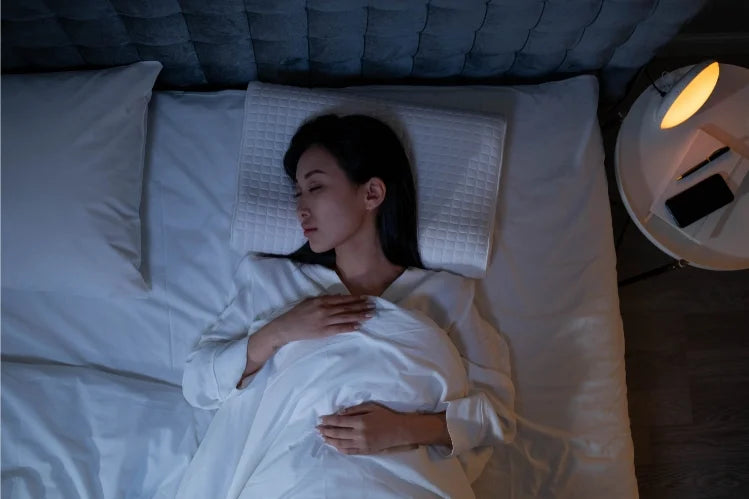Sommario
Respirare è qualcosa che facciamo naturalmente, ma per alcuni può essere una lotta, soprattutto durante il sonno. Problemi come russare, apnea notturna e vie aeree ostruite possono disturbare il sonno e influenzare la salute generale. Gli allineatori trasparenti sono noti per raddrizzare i denti , ma possono anche svolgere un ruolo nel migliorare la respirazione e la qualità del sonno. Esploriamo come gli allineatori trasparenti possono fare la differenza.
Allineamento dei denti e respirazione
Che ci crediate o no, l'allineamento dei denti può avere un impatto sulla respirazione. Quando i denti sono disallineati, possono influire sulla posizione della lingua e della mascella, potenzialmente restringendo le vie respiratorie.
Ciò può portare a problemi come il russare e l'apnea notturna, in cui la respirazione viene temporaneamente interrotta durante il sonno. Gli allineatori trasparenti lavorano per raddrizzare gradualmente i denti, il che può aiutare a migliorare l'allineamento della mascella e delle vie aeree, riducendo potenzialmente i problemi respiratori.
Come gli allineatori trasparenti migliorano la respirazione

1. Miglioramento dell'allineamento della mascella: gli allineatori trasparenti spostano delicatamente i denti nella posizione corretta, il che può anche migliorare l'allineamento della mascella. Ciò può aiutare ad aprire le vie aeree e ridurre le ostruzioni che possono causare problemi respiratori.
2. Maggiore flusso d'aria: allineando correttamente i denti, gli allineatori trasparenti possono aiutare a creare più spazio nella bocca, consentendo un migliore flusso d'aria. Ciò può ridurre la probabilità di russare e migliorare i modelli respiratori generali, specialmente durante il sonno.
3. Rischio ridotto di apnea notturna: l'apnea notturna è spesso collegata a disallineamento della mascella e ostruzione delle vie aeree. Gli allineatori trasparenti possono aiutare ad affrontare questi problemi, riducendo potenzialmente il rischio di apnea notturna e migliorando la qualità del sonno.
Considerazioni importanti
Sebbene gli allineatori trasparenti trasformino i sorrisi insieme ad altri benefici significativi per la respirazione e il sonno, è essenziale considerare potenziali rischi e limitazioni. Gli allineatori trasparenti potrebbero non essere adatti a casi gravi di problemi respiratori o apnea notturna, che potrebbero richiedere trattamenti più intensivi. Inoltre, gli allineatori trasparenti richiedono un uso costante per essere efficaci, quindi se non sei serio nell'indossarli come indicato, potresti non vedere i risultati desiderati.
Un'altra considerazione è che gli allineatori trasparenti potrebbero non risolvere i problemi di fondo che causano problemi respiratori, come allergie, problemi ai seni nasali o obesità. È essenziale collaborare con il proprio medico per risolvere questi problemi di fondo insieme al trattamento con allineatori trasparenti per ottenere i migliori risultati.
Inoltre, gli allineatori trasparenti potrebbero non essere adatti a tutti, quindi è fondamentale consultare un ortodontista per valutare se rappresentano la soluzione giusta per te.
Vantaggi degli allineatori trasparenti per la respirazione e il sonno

Ci sono anche altri vantaggi degli allineatori trasparenti che dovresti tenere a mente
1. Comodi da indossare: gli allineatori trasparenti sono realizzati su misura per adattarsi comodamente ai tuoi denti, rendendoli facili da indossare, anche durante il sonno.
2. Migliore salute orale: i denti più dritti sono più facili da pulire, riducendo il rischio di malattie gengivali e altri problemi di salute orale che possono influenzare la respirazione.
3. Trattamento non invasivo: a differenza degli apparecchi tradizionali, gli allineatori trasparenti sono rimovibili e non richiedono procedure invasive, il che li rende un'opzione più confortevole per migliorare la respirazione e il sonno.
Conclusione
Gli allineatori trasparenti offrono più di un semplice sorriso dritto; possono anche migliorare la respirazione e la qualità del sonno. Allineando i denti e migliorando l'allineamento della mascella, gli allineatori trasparenti possono aiutare a ridurre i problemi respiratori come il russare e l'apnea notturna. Se hai problemi respiratori, prendi in considerazione di parlare con il tuo ortodontista su come gli allineatori trasparenti potrebbero aiutarti a migliorare la respirazione e il sonno.
Domande frequenti
1. Gli allineatori trasparenti possono aiutare contro il russare e l'apnea notturna?
Gli allineatori trasparenti possono potenzialmente migliorare la respirazione allineando i denti e la mascella, il che può ridurre il russare e il rischio di apnea notturna. Tuttavia, potrebbero non essere adatti per casi gravi di apnea notturna.
2. Per quanto tempo devo indossare gli allineatori trasparenti per vedere i risultati?
La durata del trattamento varia a seconda del singolo caso. La maggior parte delle persone indossa gli allineatori trasparenti per diversi mesi o alcuni anni per ottenere l'allineamento desiderato.
3. Gli allineatori trasparenti sono comodi da indossare durante il sonno?
Gli allineatori trasparenti sono progettati per essere comodi da indossare, anche durante il sonno. Sono realizzati su misura per adattarsi ai tuoi denti e non dovrebbero causare fastidio.
4. Posso rimuovere gli allineatori trasparenti prima di dormire?
Sebbene gli allineatori trasparenti siano progettati per essere indossati per la maggior parte del giorno, anche durante il sonno, possono essere rimossi per brevi periodi, ad esempio per mangiare o lavarsi i denti. Tuttavia, è importante indossarli costantemente per ottenere i migliori risultati.













